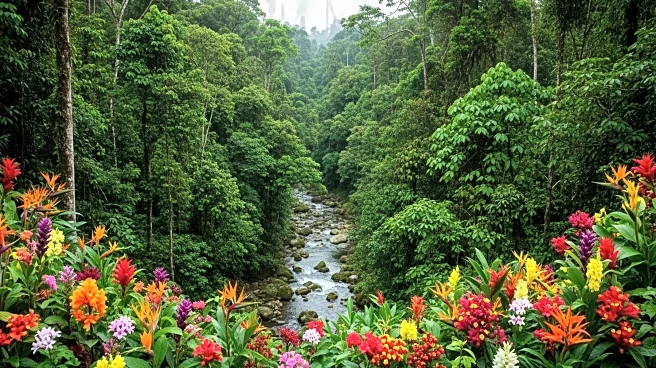What's Happening?
Survival International, an Indigenous rights organization based in London, has released a report highlighting the severe threats faced by uncontacted Indigenous tribes across the globe. The report identifies
196 uncontacted groups, primarily located in South American countries sharing the Amazon rainforest. These tribes face significant risks from logging, mining, and agribusiness, with nearly 65% threatened by logging alone. The report warns that half of these groups could be wiped out within the next decade if governments and companies do not take action. Uncontacted peoples are contemporary societies that choose to avoid outsiders due to historical violence and disease. They play a crucial role in preserving forests, which are vital in combating climate change.
Why It's Important?
The potential extinction of uncontacted Indigenous tribes poses a significant threat to global biodiversity and climate stability. These communities are integral to maintaining the health of the Amazon rainforest, a critical component in the fight against climate change. The destruction of their territories for industrial purposes not only endangers their existence but also accelerates environmental degradation. The report calls for stronger legal protections and a shift in public perception to view these tribes as essential contributors to global ecological health. The loss of these communities would mean the loss of invaluable cultural knowledge and traditions, further diminishing global diversity.
What's Next?
Survival International advocates for a global no-contact policy, urging legal recognition of uncontacted territories and the suspension of industrial projects near these lands. Governments are encouraged to enforce Indigenous territories as off-limits to extractive industries. Corporations and consumers are called upon to trace supply chains to ensure commodities are not sourced from Indigenous lands. Public opinion and pressure are deemed essential in achieving these goals. The report emphasizes the need for international cooperation to protect these tribes and their territories, highlighting the interconnectedness of human rights and environmental conservation.
Beyond the Headlines
The report sheds light on the ethical and legal dimensions of protecting uncontacted tribes. International law requires free, prior, and informed consent (FPIC) for activities on Indigenous lands, but obtaining consent from isolated groups poses significant challenges. The report highlights the need for a paradigm shift in how the world views these communities, recognizing their rights to self-determination and their critical role in global ecological health. The ongoing threats from organized crime and industrial interests underscore the urgency of implementing protective measures.









